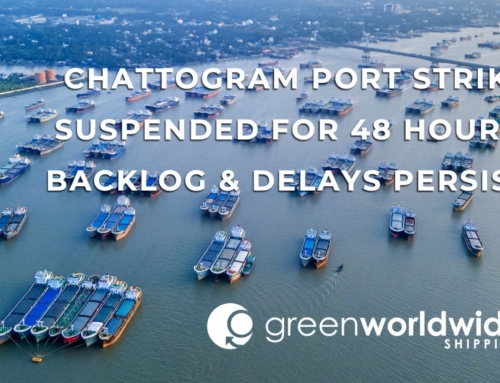UPDATE – READ ABOUT CBP GUIDANCE ISSUED FOR THESE EXPANDED SECTION 232 STEEL & ALUMINUM DUTIES HERE: https://www.greenworldwide.com/cbp-issues-formal-filing-guidance-for-expanded-section-232-steel-and-aluminum-derivative-products/
WHICH STEEL AND ALUMINUM PRODUCTS ARE NOW SUBJECT TO SECTION 232 DUTIES?
The Bureau of Industry and Security (BIS) has added 407 HTSUS codes to the list of products treated as steel or aluminum derivative products. These goods will now be subject to duties under Section 232 tariffs, effective for entries on or after 12:01 a.m. EDT on August 18, 2025. For each classification, only the steel or aluminum content is subject to Section 232 tariffs, while the non-steel or non-aluminum content will remain subject to other reciprocal or applicable duties.
WHAT TRIGGERED THIS CHANGE?
This expansion follows Proclamations 10895 and 10896 adjusting imports of aluminum and steel. These directives authorized BIS to establish an inclusion process for derivative products and to publish revisions to the Harmonized Tariff Schedule of the United States (HTSUS). The first submission cycle for the Section 232 Inclusions Process closed earlier this year, with BIS finalizing decisions after public comment.
WHICH NEW HTSUS CODES FALL UNDER SECTION 232?
The notice modifies Subchapter III of Chapter 99, HTSUS, to incorporate a wide range of additional products across industrial, consumer, chemical, and machinery categories.
Steel-Related Additions
- Structural & Track Components
- 7216.91.0010 – Drilled/notched/punched/cambered steel shapes
- 7302.90.9000 – Other railway/tramway track construction material of iron/steel
- 7307.19.30 / 7307.19.90 – Ductile iron and other tube/pipe fittings
- Fabricated & Fastening Components
- 8302 series – Hinges, mounting fittings, and base metal fittings
- 8307.10.60 – Flexible tubing of base metal
- Machinery & Rolling Mill Parts
- 8406.90.4000 – Turbine blades
- 8454.20.0010 / 0060 – Steel ingot casting machines
- 8455.30.00 / 8455.90 – Rolls and castings for rolling mills
- Bearings, Gears, and Transmission Parts
- 8482 series – Multiple bearing types and components
- 8483 series – Transmission shafts, gears, couplings, gearboxes
Aluminum-Related Additions
- Wire & Cable
- 7614.10.10 – Stranded wire, cables, plaited bands of aluminum
- Machined & Finished Components
- 3925.20.00 – Doors, windows, frames, thresholds (plastic/aluminum content mix)
- 8202.39.0040 – Diamond sawblade cores
- 8205.70.00 – Vises, clamps, parts thereof
Mixed Metal Product Categories (Steel/Aluminum Content)
- Household Appliances
- 8418.21.00 / 8418.29.20 – Refrigerators/freezers
- 8419.81.50 – Cooking stoves, ranges, ovens
- 8424.10.0000 – Fire extinguishers
RELATED ARTICLES
- Vehicles & Transport
- Multiple 8701–8716 series codes for tractors, trucks, trailers, motor vehicles, motorcycles, and related parts
- Includes mufflers, exhaust systems, clutches, and couplings (8708 series)
- Furniture & Fixtures
- 9403.10.00 – Metal office furniture
- 9403.99.9040 – Parts for steel racks
The annexes list the complete scope of codes affected. Importers should carefully review product classifications to determine whether their goods are affected.
HOW DOES THIS SECTION 232 EXPANSION AFFECT FOREIGN TRADE ZONE (FTZ) ENTRIES?
Derivative products admitted into a U.S. Foreign Trade Zone (FTZ) under privileged foreign status before August 18, 2025, may retain prior duty treatment, provided they were processed from U.S.-origin steel. Supporting melt-and-pour origin documentation must be available at the time of customs filing. Goods entered after the effective date will be assessed under the expanded Section 232 scope.
HOW WILL NON-STEEL AND NON-ALUMINUM CONTENT BE TREATED?
Annex II clarifies that additional duties do not apply to the declared value of the steel or aluminum content of covered products but will apply to non-steel and non-aluminum components. This ensures that duty assessments are segmented and that Section 232 tariffs remain limited to metallic content.
WHAT STEPS SHOULD IMPORTERS TAKE NOW TO COMPLY WITH THIS SECTION 232 STEEL, ALUMINUM, AND MIXED METALS PRODUCT EXPANSION?
To mitigate compliance risk and avoid unexpected duty exposure, importers should:
- Partner with a trusted Customs broker to ensure compliance.
- Review classifications to confirm whether products fall under the newly listed HTSUS codes.
- Verify declared steel and aluminum content values for derivative goods.
- Ensure origin documentation is available to support melt-and-pour certifications.
- Audit FTZ entries and confirm privileged foreign status where applicable.
CBP indicated that full enforcement will proceed without delay. Importers across consumer goods, chemicals, transportation, and industrial sectors should act now to align entry documentation and compliance processes.
Stay up-to-date on freight news with Green’s Weekly Freight Market Update by following us on LinkedIn. For continuous updates, make sure to check out our website at greenworldwide.com.






